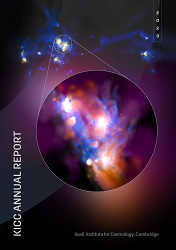
Submitted by Administrator on Mon, 28/09/2020 - 17:38
Professor John D. Barrow FRS 1952-2020
It is with great sadness that we report the passing of John Barrow, Professor of Mathematical Physics and Fellow of Clare Hall. He was a renowned theoretical cosmologist and mathematical physicist who also had a profound influence on the public understanding of science through his public lectures, his many popular science books, and his leadership of the Millennium Mathematics Project, which recently participated in an outreach project supported by the Kavli Foundation, together with the Kavli Institute for Cosmology.
After obtaining a degree in mathematics and physics from Durham University in 1974, he completed his doctorate in astrophysics in Oxford under the supervision of Dennis Sciama, while studying at Magdalen College. He took up postdoctoral positions at the University of California, Berkeley from 1974 and he became a Junior Research Lecturer at Christ Church Oxford in 1977. In 1981 he joined the University of Sussex, where he rose to become Professor and Director of the Astronomy Centre.
In 1999 he was appointed Professor of Mathematical Sciences in the Department of Applied Mathematics and Theoretical Physics and was made Director of the newly initiated Mathematics Millennium Project. In 2003, he was elected Fellow of the Royal Society.
John Barrow’s primary research interests lay in theoretical cosmology, the study of the universe on the largest scales, encompassing its origins and ultimate fate. His output was prodigious, publishing more than 500 research papers in astrophysics and cosmology, many as single author papers. His research has included using astronomy to probe fundamental physics, making measurements with accuracies beyond those possible in laboratory or accelerator experiments, notably determining whether there may have been slow variations in the “constants of nature” during cosmic history. Another key research interest was proposing and investigating models of cosmological inflation in the early universe and also endeavouring to understand the mystery of dark energy in the late universe, the accelerated expansion discovered in 1998. He also applied his deep understanding of general relativity to cosmology, especially solutions that describe anisotropic and inhomogeneous cosmological models, the nature of singularities and chaotic properties of matter near the Big Bang. He also explored many aspects of the history and philosophy of cosmology, especially on the anthropic principle, that is, about the necessary physical ingredients for the emergence of life within our Universe.
Within DAMTP, John Barrow was a pillar of the Relativity and Gravitation group and the linked Centre for Theoretical Cosmology, as well as an active member of the High Energy Physics group. He interacted extensively with a broad range of his colleagues by whom he is remembered with great affection. His wisdom and humour will be especially missed at the coffee mornings, along with his vast knowledge of the history of science and his remarkable anecdotes. One such was being introduced at Christ Church Oxford by Henry Chadwick, who wondered aloud whether he would meet the standard set by the previous fellow appointed in general relativity, who happened to be Albert Einstein.
John Barrow had a profound influence on public engagement in science and in education. The Millennium Mathematics Project, which he directed since 1990, is an outreach programme for school students, teachers and the general public. It was awarded the Queen’s Anniversary Prize for educational achievement in 2006. Within the context of the Millennium Mathematics Project, John Barrow helped to establish a new, high impact outreach programme together with the Kavli Institute for Cosmology and with the Kavli Foundation. He has written more than twenty books about many of the wider aspects of science and mathematics. His books have been translated into twenty-eight languages and in 2008 he won the Royal Society’s Michael Faraday Prize for "excellence in communicating science to UK audiences." He has delivered lectures from 10 Downing Street to the Venice Film Festival. He is the author of the (Italian-language) Infinities, which won the Italian Premi Ubu award for the best play in Italian theatre in 2002. The play focuses on mathematical and scientific ideas, rather than characters. The Guardian critic Marcus de Sautoy described it as “an extraordinary piece that has more in common with installation art than with the drawing-room dramas served up in London's West End.” In 2006, his forays into the relation between science, philosophy and religion were rewarded with the prestigious Templeton Prize which carries a large award over US$1M.
John Barrow has been the recipient of many other honours. He was Gresham Professor of Astronomy (2003-7) and Gresham Professor of Geometry (2008-12) at Gresham College London, only the second professor in Gresham College’s 400 year history to have been appointed to the two separate chairs. Institute of Physics in 2015 and the Gold Medal of the Royal Astronomical Society in 2016. He was elected FRS in 2005, and subsequently to other foreign academies. He derived special satisfaction from his election this year to the Pontifical Academy of Sciences. This is the oldest supranational Academy in the world; it is limited to 80 members – of all faiths and none. Knowing his health was failing, he had arranged a video of the inaugural talk he had hoped to present at the Academy’s plenary meeting in October. It was a fitting culmination to his long and distinguished career.
John will be greatly missed by his many colleagues and friends in Cambridge, by those in the worldwide astronomy community and far beyond. He is survived by his wife Elizabeth, their two sons, Roger and David, their daughter Louise, and six grandchildren.
(adapted from the obituary published by DAMTP)


